ARTICLE AD BOX
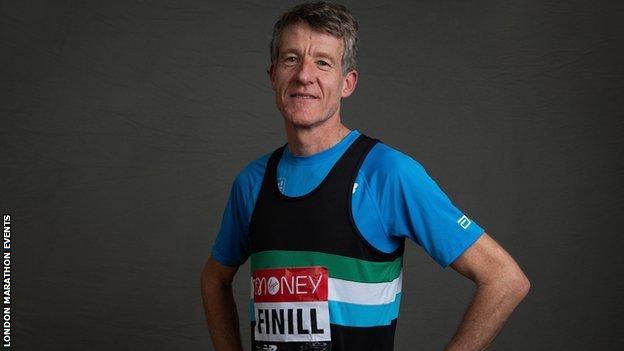 Finill has been running competitively since he was 14. The 1981 London Marathon was his third race over the distance
Finill has been running competitively since he was 14. The 1981 London Marathon was his third race over the distance| Date: Sunday, 3 October Time: 08:50 BST (elite wheelchair race), 09:00 BST (elite women), 09:30 BST (elite men and mass start) Course: Blackheath to The Mall |
| BBC coverage: Watch live on BBC Two from 08:00 and BBC One from 10:00 with uninterrupted coverage and extra streams on the Red Button, the BBC Sport website and BBC Sport app; live text from 08:00. |
Early on Sunday morning, Chris Finill will pack his trainers and socks into a backpack, pull on a pair of old beaten-up shoes and set off for Blackheath.
When you have completed all 40 London Marathons, a streak stretching back to 1981's inaugural race, you pick up these little things.
Like how traipsing across Blackheath's dewy grass to the start line can leave your feet sodden before you have even worked up a sweat.
At 62, Finill is the youngest of the 10 men to have run every London marathon. The oldest is Ken Jones at 88. Each has covered over 1,000 miles in the race and many, many times more in training over the years.
This year, eight of them will line up to attempt to keep their unbroken run going for another edition.
At the start, on the course, in the aftermath, there will be familiar sights and feelings. But there will also be some big differences to 1981.
"People who ran marathons back then were usually wizened warriors from athletics club, who took the sport very seriously," Finill told BBC Sport.
"It was a fairly tightly defined group of people. You used to get shouted at when you were training, because it was such an unusual sight to see people running down the street.
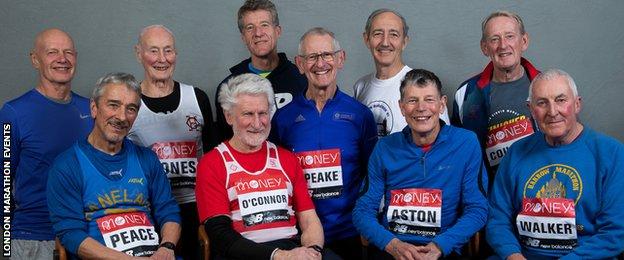 The 10 men to run every London Marathon gathered together in February 2020
The 10 men to run every London Marathon gathered together in February 2020"But these days, marathon running is as mainstream as anything. It attracts a much broader range of society running for many different reasons.
"Running a marathon in the early 80s was seen as a bit insane. Now though it is seen as a way to preserve your sanity, sort of an extension of mindfulness to give you a chance to switch off in a complicated world."
The runners have changed, but so has the race and the city.
"There are a few subtle changes each year but the course is still essentially the same. It starts in Blackheath, half of the race is north of the river, half of the race is south, it heads out east to the Isle of Dogs and then back to the West End," said Finill.
"What has changed is the landscape, particularly out east near Canary Wharf and the Isle of Dogs. That area has transformed over the last 40 years. It was a relatively sparsely populated area. Now it is much more glitzy and similar to the City in terms of the wealth and affluence.
"The internet didn't exist in 1981. If you were in the first 1,000 or so, you would either read your official time in the paper the next day, or have to wait for it to arrive in the post.
"The only people watching that first race were either connected to the runners or just drawn through sheer curiosity. There were some sections where there wasn't anyone watching. Now it is such an event. The crowds are much bigger and all around the course."
Of course, last year, for once, they weren't.
On 13 March 2020, the sporting world drew down the shutters. The London Marathon announced it was shifting from its usual April date to October as the Covid-19 pandemic spread out of control.
On the same day, the elite football across the United Kingdom was suspended, the Six Nations was put on hold and the Masters postponed.
Marathon organisers had hoped that a six-month delay would buy them enough time to stage the event as usual. It wasn't nearly enough.
With a second and third national lockdown still to come, the elite field raced through autumnal rain on 19 laps of a closed course. The mass participation element went virtual with runners logging their 26.2 miles on a course of their choosing.
Finill chose Dunsfold Aerodrome, the race track where Top Gear puts various celebrities through a one-lap time trial.
He did nearly nine laps to make up the required distance.
"It was a very different experience and a lot harder. Without the other people and buildings to shield you it was extremely windy," he said.
"But more than that, you don't get that sense of being part of something much, much bigger than yourself.
"I think this year's London will be emotional for everyone, not just people who have run a few times before.
"It is such a sign of a return towards normality that I think a lot of people will be very joyous and relieved to be on the start line."
This year, Finill has helped train Great Britain's 1988 Olympic hockey gold medallist Steve Batchelor for the race.
Batchelor is raising money for Alzheimer's Research UK in honour of former team-mate Imran Sherwani, who suffers from the disease.
For Finill though, some things are a staple.
On Sunday morning, when he's dispensed his final advice and swapped into dry shoes, he will slip into the same mindset he had in 1981.
"The way I experience the race has not changed at all," he said.
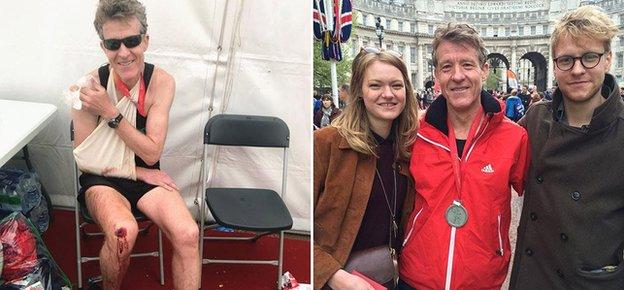 Finill completed the 2018 race (left) despite breaking his arm in four places less than four miles in and with his daughter Jo and son Tom (right) after a less stressful completion
Finill completed the 2018 race (left) despite breaking his arm in four places less than four miles in and with his daughter Jo and son Tom (right) after a less stressful completion"There is more stress around being an Ever Present in the build-up each year but when the gun goes off I can completely relax, focus on the race and enjoy it.
"It is an honour and a privilege to be in this position, there can't be many people in the advanced stages of their running career to have this structure to aim for each year."

 3 years ago
42
3 years ago
42
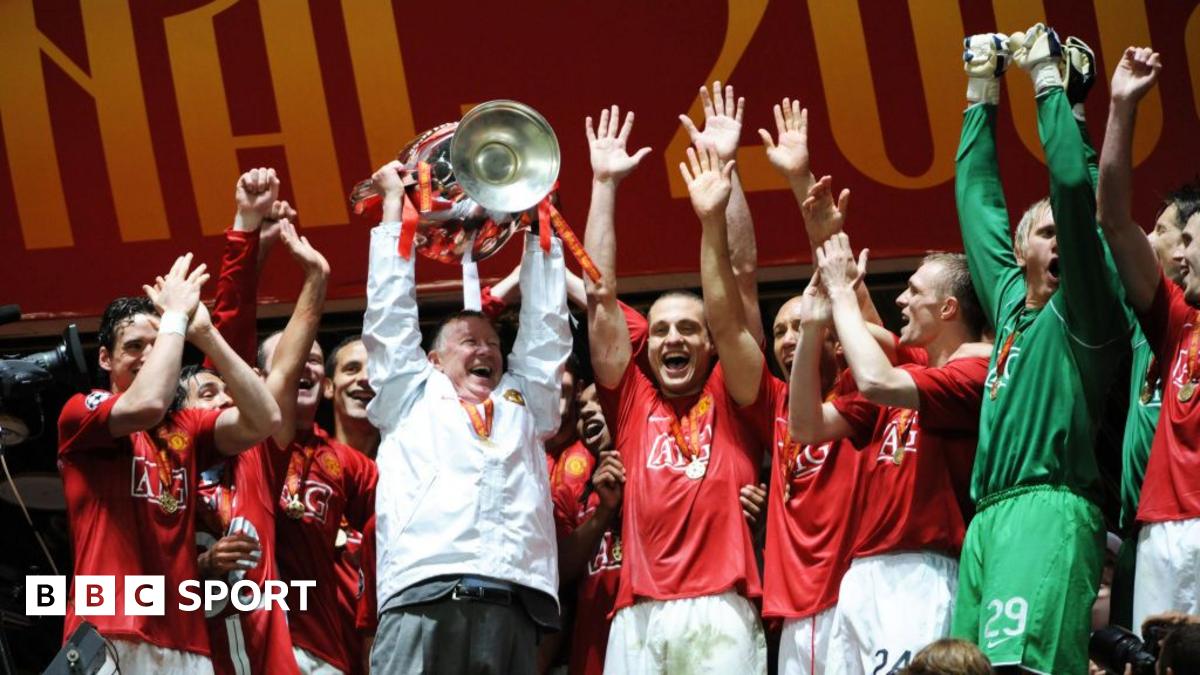
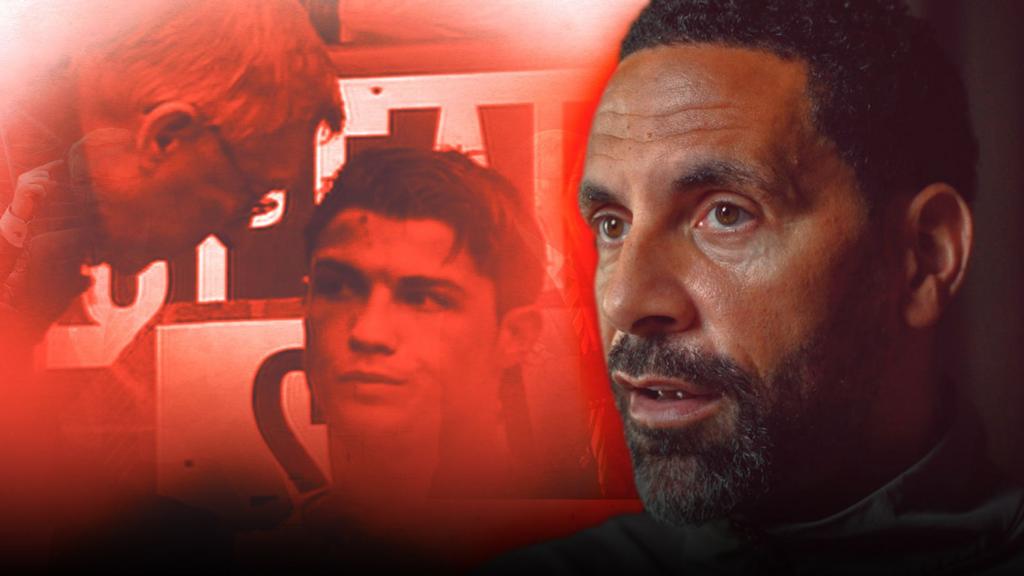






 English (US) ·
English (US) ·